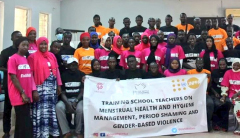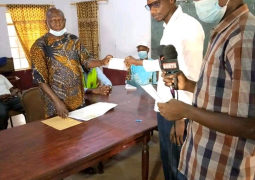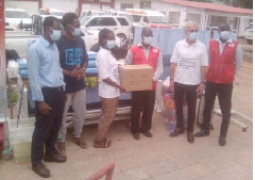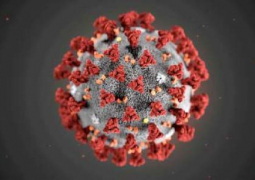
The participants were trained on various key topics including, menstrual health and hygiene management, period shaming and Gender-Based Violence among others. The participants were also provided with training materials for each of the areas they were trained.
However, the training of these participants, who are to serve as trainers, was held in Upper River, Central River and Lower River Regions respectively.
The capacity building was aligned to efforts geared towards achieving Sustainable Development Goals four and five; quality education and gender equality respectively.
Fatoumatta Jabbi-Kassama, founder and Chief Executive Officer (CEO) of Girls’ Pride, said the training was designed to end period poverty in schools and communities.
“To achieve this, teachers need to be trained on menstrual hygiene management, period shaming, and gender-based violence. And Girls’ Pride believes that by empowering teachers with the right knowledge, and skills they will be able to teach many boys and girls in their various schools and they will also use their influence in their local communities to educate community members. ” she stated.
She explained that period poverty affects girls’ education in many ways and when girls lack sanitary pads, knowledge on how to take care of themselves during their periods, or lack sanitation facilities in their schools, they are unable to stay in school and learn.
Madam Jabbi-Kassama observed that majority of girls from low-income families missed 3 to 5 days out of school during their periods every month, which she added, leads to poor performance and eventually some girls will drop out of school.
“They are faced with lifetime consequences such as forced/child marriage, FGM, teenage pregnancies, anxiety, depression, or suicidal thoughts. As they grow older, some are at a higher risk of reproductive health problems like STI, HIV & AIDS, obstructed labour, and maternal death,” she added.
She suggested that simple interventions such as training of teachers, community sensitization activities on menstrual hygiene management, period shaming, and gender-based violence with provision of sustainable and eco-friendly sanitary pads can keep the girls in schools would go a long way in according them the opportunity to achieve their dreams and realize their full potentials and contribute to economic growth.
At the end of the week-long training, Girls’ Pride used drama, group work, and group presentations to evaluate the teachers and ensure that they understood what was taught.
Meanwhile, participants are expected to conduct a step-down training in their various schools upon return in a bid to create more awareness among students on menstrual health, period shaming, and gender-based violence.
The training was funded by the Italian Agency for Development Cooperation through UNFPA-The Gambia and Network Against Gender-Based Violence.





